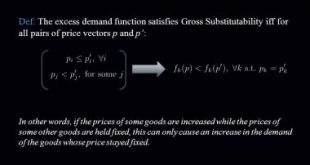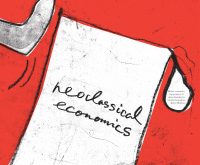The gross substitution axiom Economics is perhaps more than any other social science model-oriented. There are many reasons for this — the history of the discipline, having ideals coming from the natural sciences (especially physics), the search for universality (explaining as much as possible with as little as possible), rigour, precision, etc. Mainstream economists want to explain social phenomena, structures and patterns, based on the assumption that the...
Read More »How to cope with the behavioural challenge
How to cope with the behavioural challenge How would you react if a renowned physicist, say, Richard Feynman, was telling you that sometimes force is proportional to acceleration and at other times it is proportional to acceleration squared? I guess you would be unimpressed. But actually, what most mainstream economists do amounts to the same strange thing when it comes to theory development and model modification. In mainstream economic theory,...
Read More »Alan Kirman on why modern economics is of so little use
Alan Kirman on why modern economics is of so little use [embedded content] Almost a century and a half after Léon Walras founded general equilibrium theory, economists still have not been able to show that markets lead economies to equilibria. We do know that — under very restrictive assumptions — equilibria do exist, are unique and are Pareto-efficient. But what good does that do? As long as we cannot show that there are convincing reasons to suppose...
Read More »Profitfri skola? Ja tack!
Profitfri skola? Ja tack! Som diskuterats tidigare kommer utförarens drivkrafter att spela en betydande roll för den verksamhet som bedrivs och det är svårt att via regelverket förhindra att utförarens motiv kan dra i en oönskad riktning … Exempelvis finns det anledning att ifrågasätta om de incitament till kostnadsminimering som vinstmotivet ger upphov till verkligen är lämpliga i skolan. Det helhetsansvar och den budget för en elev som en skola har för...
Read More »After the crisis — business as usual
After the crisis — business as usual In contrast to the experience of the Great Depression, which led to the emergence and acceptance of novel theoretical concepts on a large scale, the financial crisis and its consequences have, by and large, been rationalized with reference to existing theoretical concepts. Although we do observe a slight shift away from the idea that financial markets are efficient by default and prices only follow random walks, the...
Read More »When did you last hear an economist say something like this?
When did you last hear an economist say something like this? If the observations of the red shift in the spectra of massive stars don’t come out quantitatively in accordance with the principles of general relativity, then my theory will be dust and ashes. Albert Einstein (1920) Advertisements
Read More »The Gambler’s Ruin (wonkish)
The Gambler’s Ruin (wonkish) [embedded content] [In case you’re curious what happens if you start out with $25 but we change the probabilities — from 0.50, 0.50 into e. g. 0.49, 0.51 — you can check this out easily with e.g. Gretl:matrix B = {1,0,0,0; 0.51,0,0.49,0;0,0.51,0,0.49;0,0,0,1} matrix v25 = {0,1,0,0} matrix X = v25*B^50 X which gives X = 0.68 0.00 0.00 0.32] Advertisements
Read More »Vad har vi för glädje av ekonomer?
Vad har vi för glädje av ekonomer? [embedded content] Advertisements
Read More »Die Risikogesellschaft
[embedded content] Advertisements
Read More »Schlechte Wissenschaft
Wenn Wissenschaftler etwas herausgefunden haben – wann kann man sich auch tatsächlich darauf verlassen? Eine Antwort lautet: Wenn Fachkollegen die Studie überprüft haben. Eine andere: Wenn sie in einer renommierten Fachzeitschrift veröffentlicht wurde. Doch manchmal reicht auch beides zusammen nicht aus, wie Forscher jetzt gezeigt haben. Und zwar auf die beste und aufwendigste Art: Sie haben die zugrundeliegenden Experimente wiederholt. Und geschaut, ob noch einmal dasselbe...
Read More » Lars P. Syll
Lars P. Syll





